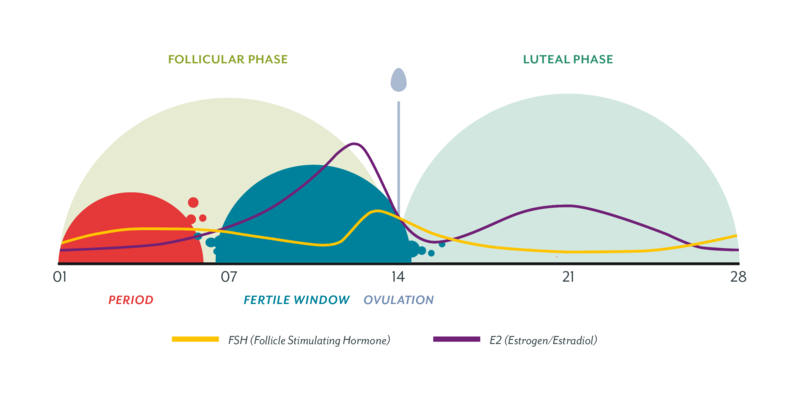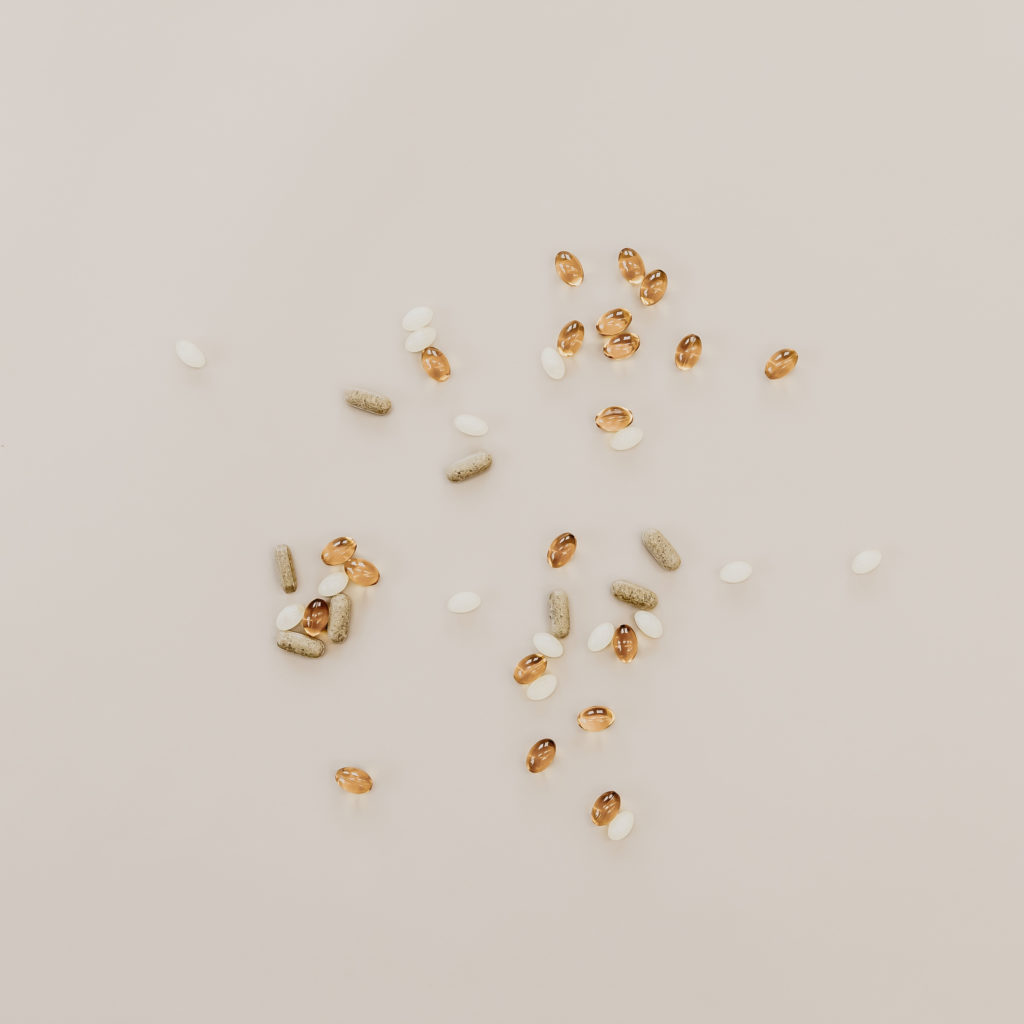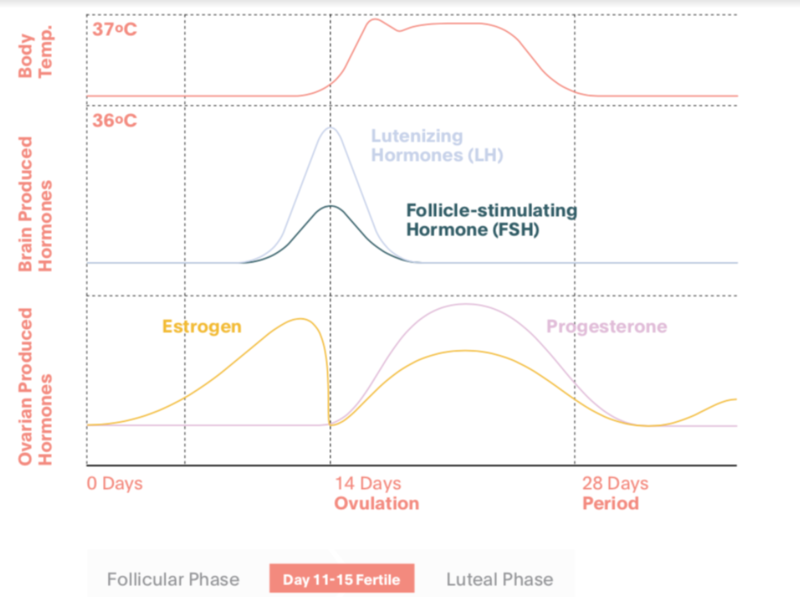Registered dietitian, functional nutritionist, & your new fertility BFF. I'm passionate about helping women thrive during preconception, pregnancy, and postpartum.
Nutrition
PCOS
Fertility
View All
Explore the blog
Hi, I'm Anabelle
Non-toxic Living
Work with our team
Understanding Progesterone: The Key to a Healthy Luteal Phase
One of the best ways to start prepping for pregnancy and optimizing your fertility, is to become more aware of your sex hormones like estrogen, progesterone, and testosterone. If you’ve been tracking your cycle for a while now, you may know that there are two distinct phases of the cycle – your follicular phase and your luteal phase.
Many women experience issues in their luteal phase, which is connected to the hormone progesterone. In this blog, we’ll cover in depth what progesterone is, how to measure it, and what you can do to improve progesterone levels naturally.

What is Progesterone?
Progesterone is a steroid hormone made from cholesterol, and is made from luteine cells in the uterus. These cells will make progesterone until the placenta is strong enough to make progesterone on it’s own, and will continue to do so for the rest of pregnancy.
We make progesterone for about 2 weeks during the luteal phase after ovulation.

The follicle turns into the corpus luteum (aka yellow body), which is what makes progesterone. Your body does not make progesterone in the first half of your cycle.
The first half of your cycle (your follicular phase) is where estrogen is released. You need that rise in estrogen to ovulate, and then progesterone kicks in.
So why is this important for fertility?
Progesterone is your pro-gestation hormone. It helps grow a baby in your uterus and thrive there. When progesterone is made, it’s made for the first 8-10 weeks from the corpus luteum, at which point the placenta should be strong enough to take over.
However, for some women their corpous luteum is not strong enough to make progesterone last for 8-10 weeks, which often leads to early pregnancy loss. Having a healthy amount of progesterone plays a large factor in preventing miscarriage.
The problem is, many fertility clinics will test progesterone from a blood draw on one day of the cycle, but the levels of progesterone can change dramatically throughout the day (and month). Additionally, many women don’t know that they need to check their progesterone levels in the second half of the cycle – this is KEY!
One way to check progesterone levels at home is by using progesterone test strips, like the Proov test strips – which will tell you if you have healthy levels of progesterone after ovulation.
In addition to helping to prevent miscarriage, progesterone is important for priming the uterine lining for implantation.
When should levels be measured for progesterone?
If you’re working with a fertility clinic, it’s important that you check your progesterone levels in the second half of your cycle. Remember, you don’t make progesterone in the first half of your cycle.
Ideally, you would check progesterone levels 5-7 days after ovulation. If you ovulate on day 14, then you want it on day 19-21 to measure, before the start of your period.
While a serum test can be helpful, a DUTCH test provides more information because it measures progesterone at 4 different points throughout the day and takes the average.
[If you’re interested in taking the DUTCH test and having your labs interpreted by me, schedule a call below to chat!]

Because progesterone will be vastly different at different times of the day, it’s best to get a reading at different parts of the day for the most accurate picture of your progesterone levels.
Additionally, progesterone can be made on certain days but then can putter out very quickly. Some signs of low progesterone could be tender breasts, PMS symptoms, and heavy periods.
What are Optimum Serum Levels of Progesterone?
Ideally, serum levels are above 10. Lower numbers are indicative of a weak corpus luteum, and if your levels are extremely low, it could be that you’re not ovulating at all, and rather progesterone is being made from the adrenals glands, and not the ovaries at all.
SIGNS OF LOW PROGESTERONE:
- PMS – mood changes, bloating, tender breasts
- Heavy periods, clotting, worse endometriosis symptoms
- Insomnia and stress or anxiety before period (progesterone impacts GABA, a neurotransmitter that calms things down)
- Spotting before period (losing the uterine lining that you’re supposed to maintain)
- Short luteal phase (should be 12-14 days ideally, anything shorter can be a sign of low progesterone)
Suggested Reading: How to Find Your Fertile Window
Remember, hormones are not just about reproduction – hormones impact the cardiovascular system, brain health, immune system, gut health, and essentially every system in the body!
What You Can Do to Increase Progesterone
Okay, so now that we know progesterone is important, and perhaps you’ve noticed signs of low progesterone either from a test, or symptoms mentioned above – what can you do about it?

1. Manage your stress levels
When you have a lot of stress, whether or not it’s real stress or perceived stress – your body will react in the same way.
Cortisol, epinephrine and norepinephrine will feed back to the brain and let your brain know that there’s a lot of stress here.
The brain will then decrease signaling of estrogen and progesterone. Women will first lose progesterone, which will cause you to not ovulate. If the stress is strong enough, then it will down regulate FSH and estrogen, and you will have amenorrhea and skip cycles completely.
This is your body’s way of protecting you. If you’re being chased by a tiger (stress), it’s probably not a good time to make a baby. So working on self care, and anything to support your body like good sleep, healthy relationships, regular movement, etc. is going to be helpful in managing stress, but also in making enough progesterone.
Of course, if you’re trying to conceive or in the middle of fertility treatments, you’re likely very stressed. It’s not helpful for me to tell you that you just need to stop stressing, but understanding the biochemistry behind how stress impacts ovulation and progesterone can give you a better understanding of how your lifestyle choices are impacting fertility.

2. Work on Your Gut Health
Your immune system starts in the gut, and any inflammation happening there will negatively impact progesterone production as well.
Whether you are taking a comprehensive stool test, or just taking the 5R approach to gut health – taking care of your digestion will help balance out your hormones in the long run.

3. Stop Under-Eating and Over-Exercising
As a reminder, all steroid hormones are made from cholesterol. If you have very low levels of cholesterol you may be not be able to make sex hormones like estrogen and progesterone.
Additionally, leptin (a hormone made from fat tissue) is a big sign for fertility -it will tell your brain if you have enough fat on you to actually carry a pregnancy term.
If you’re a marathon runner, extreme athlete, have an active eating disorder, or just really cutting calories and over-excerising and have a very low body fat percentage, your cycles will stop or skip in order for your body to reduce your chances of getting pregnant.
HOW TO BALANCE PROGESTERONE THROUGHOUT THE CYCLE
If you’re having troubles with your progesterone levels or have a short luteal phase, it may be tempting to JUST focus on the second half of your cycle.
The truth is that you need to support your cycle all month long to help with luteal phase defects.
In the follicular phase, your brain makes FSH to make estrogen. One follicle is chosen to release an egg, and you need to have estrogen elevated for 40-50 hours, to get an LH surge which triggers ovulation, which is what triggers corpus luteum, which triggers progesterone production.
You can’t just focus on progesterone, because there is a domino effect between all of these hormones.

Low progesterone is also a sign of low follicular health or poor egg quality. Giving progesterone as a medication does not address the root problem. While there is no adverse effect of taking progesterone, working on diet and lifestyle changes will benefit you in the long run.
That’s why working on your hormone health for at least 3 months before conceiving will be important in order to work on egg quality, progesterone, and address the root cause issues.
Natural Therapies to Increase Progesterone Levels
- Supplements that Help with Brain Health: Omega 3 fats, Gingko, Rosemary, Maca, Cordyceps – are all great for brain health. We want good signaling from the brain to the ovaries (HPO axis) Trying to get the brain back on track with neuron signaling. Maca, Cordyceps, Lion’s Mane (great for focus), and Chaga medicinal mushrooms.
- Antioxidants play a huge role on the ovaries. Melatonin, lutein foods like beta-carotene, vitamin C, selenium, and zinc can be extremely helpful to the ovaries.
- Vitex / Chaste Tree is a very common herb used to improve both estrogen and progesterone levels. Vitex has been shown to increase LH, and subsequent progesterone levels in women with luteal phase defects. This herb is not necessarily fast acting, but taken every day for 3 months has shown improvements in women in several studies.
Looking for More?
If you’re looking for more support, functional lab testing, and nutrition counseling to help you conceive, let’s schedule a free 30 minute discovery call!

I work with women in their 20s, 30s, and 40s trying to conceive – whether you have PCOS, endometriosis, or unexplained infertility, we will work together to get to the root issue and improve your chances of becoming pregnant.
I hope you learned something from this blog post, and let me know what questions you have below!

Leave a Reply Cancel reply
The Preconception Playbook
This free playbook provides specific actionable tips to get started on your fertility journey, as well as what to avoid while you're trying to conceive.
Get the free playbook
Functional nutrition for women & couples trying to conceive
Get the Preconception Playbook
Actionable tips to get started on your fertility journey, as well as what to avoid while you're trying to conceive.

Is it ok to take cordyceps after ovulation?